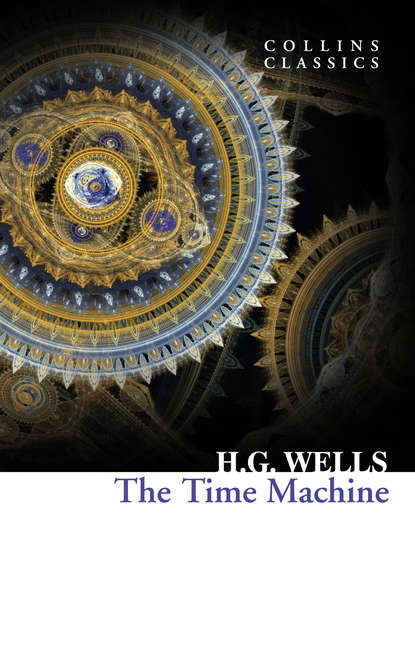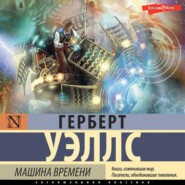По всем вопросам обращайтесь на: info@litportal.ru
(©) 2003-2024.
✖
The Time Machine
Настройки чтения
Размер шрифта
Высота строк
Поля
‘The arch of the doorway was richly carved, but naturally I did not observe the carving very narrowly, though I fancied I saw suggestions of old Phoenician decorations as I passed through, and it struck me that they were very badly broken and weather-worn. Several more brightly clad people met me in the doorway, and so we entered, I, dressed in dingy nineteenth-century garments, looking grotesque enough, garlanded with flowers, and surrounded by an eddying mass of bright, soft-colored robes and shining white limbs, in a melodious whirl of laughter and laughing speech.
‘The big doorway opened into a proportionately great hall hung with brown. The roof was in shadow, and the windows, partially glazed with coloured glass and partially unglazed, admitted a tempered light. The floor was made up of huge blocks of some very hard white metal, not plates nor slabs—blocks, and it was so much worn, as I judged by the going to and fro of past generations, as to be deeply channelled along the more frequented ways. Transverse to the length were innumerable tables made of slabs of polished stone, raised perhaps a foot from the floor, and upon these were heaps of fruits. Some I recognized as a kind of hypertrophied raspberry and orange, but for the most part they were strange.
‘Between the tables was scattered a great number of cushions. Upon these my conductors seated themselves, signing for me to do likewise. With a pretty absence of ceremony they began to eat the fruit with their hands, flinging peel and stalks, and so forth, into the round openings in the sides of the tables. I was not loath to follow their example, for I felt thirsty and hungry. As I did so I surveyed the hall at my leisure.
‘And perhaps the thing that struck me most was its dilapidated look. The stained-glass windows, which displayed only a geometrical pattern, were broken in many places, and the curtains that hung across the lower end were thick with dust. And it caught my eye that the corner of the marble table near me was fractured. Nevertheless, the general effect was extremely rich and picturesque. There were, perhaps, a couple of hundred people dining in the hall, and most of them, seated as near to me as they could come, were watching me with interest, their little eyes shining over the fruit they were eating. All were clad in the same soft and yet strong, silky material.
‘Fruit, by the by, was all their diet. These people of the remote future were strict vegetarians, and while I was with them, in spite of some carnal cravings, I had to be frugivorous also. Indeed, I found afterwards that horses, cattle, sheep, dogs, had followed the Ichthyosaurus into extinction. But the fruits were very delightful; one, in particular, that seemed to be in season all the time I was there—a floury thing in a three-sided husk—was especially good, and I made it my staple. At first I was puzzled by all these strange fruits, and by the strange flowers I saw, but later I began to perceive their import.
‘However, I am telling you of my fruit dinner in the distant future now. So soon as my appetite was a little checked, I determined to make a resolute attempt to learn the speech of these new men of mine. Clearly that was the next thing to do. The fruits seemed a convenient thing to begin upon, and holding one of these up I began a series of interrogative sounds and gestures. I had some considerable difficulty in conveying my meaning. At first my efforts met with a stare of surprise or inextinguishable laughter, but presently a fair-haired little creature seemed to grasp my intention and repeated a name. They had to chatter and explain the business at great length to each other, and my first attempts to make the exquisite little sounds of their language caused an immense amount of amusement. However, I felt like a schoolmaster amidst children, and persisted, and presently I had a score of noun substantives at least at my command; and then I got to demonstrative pronouns, and even the verb “to eat.” But it was slow work, and the little people soon tired and wanted to get away from my interrogations, so I determined, rather of necessity, to let them give their lessons in little doses when they felt inclined. And very little doses I found they were before long, for I never met people more indolent or more easily fatigued.
‘A queer thing I soon discovered about my little hosts, and that was their lack of interest. They would come to me with eager cries of astonishment, like children, but like children they would soon stop examining me and wander away after some other toy. The dinner and my conversational beginnings ended, I noted for the first time that almost all those who had surrounded me at first were gone. It is odd, too, how speedily I came to disregard these little people. I went out through the portal into the sunlit world again as soon as my hunger was satisfied. I was continually meeting more of these men of the future, who would follow me a little distance, chatter and laugh about me, and, having smiled and gesticulated in a friendly way, leave me again to my own devices.
‘The calm of evening was upon the world as I emerged from the great hall, and the scene was lit by the warm glow of the setting sun. At first things were very confusing. Everything was so entirely different from the world I had known—even the flowers. The big building I had left was situated on the slope of a broad river valley, but the Thames had shifted perhaps a mile from its present position. I resolved to mount to the summit of a crest, perhaps a mile and a half away, from which I could get a wider view of this our planet in the year Eight Hundred and Two Thousand Seven Hundred and One A.D. For that, I should explain, was the date the little dials of my machine recorded.
‘As I walked I was watching for every impression that could possibly help to explain the condition of ruinous splendour in which I found the world—for ruinous it was. A little way up the hill, for instance, was a great heap of granite, bound together by masses of aluminium, a vast labyrinth of precipitous walls and crumpled heaps, amidst which were thick heaps of very beautiful pagoda-like plants—nettles possibly—but wonderfully tinted with brown about the leaves, and incapable of stinging. It was evidently the derelict remains of some vast structure, to what end built I could not determine. It was here that I was destined, at a later date, to have a very strange experience—the first intimation of a still stranger discovery—but of that I will speak in its proper place.
‘Looking round with a sudden thought, from a terrace on which I rested for a while, I realized that there were no small houses to be seen. Apparently the single house, and possibly even the household, had vanished. Here and there among the greenery were palace-like buildings, but the house and the cottage, which form such characteristic features of our own English landscape, had disappeared.
‘“Communism,” said I to myself.
‘And on the heels of that came another thought. I looked at the half-dozen little figures that were following me. Then, in a flash, I perceived that all had the same form of costume, the same soft hairless visage, and the same girlish rotundity of limb. It may seem strange, perhaps, that I had not noticed this before. But everything was so strange. Now, I saw the fact plainly enough. In costume, and in all the differences of texture and bearing that now mark off the sexes from each other, these people of the future were alike. And the children seemed to my eyes to be but the miniatures of their parents. I judged, then, that the children of that time were extremely precocious, physically at least, and I found afterwards abundant verification of my opinion.
‘Seeing the ease and security in which these people were living, I felt that this close resemblance of the sexes was after all what one would expect; for the strength of a man and the softness of a woman, the institution of the family, and the differentiation of occupations are mere militant necessities of an age of physical force; where population is balanced and abundant, much childbearing becomes an evil rather than a blessing to the State; where violence comes but rarely and off-spring are secure, there is less necessity—indeed there is no necessity—for an efficient family, and the specialization of the sexes with reference to their children’s needs disappears. We see some beginnings of this even in our own time, and in this future age it was complete. This, I must remind you, was my speculation at the time. Later, I was to appreciate how far it fell short of the reality.
Вы ознакомились с фрагментом книги.
Приобретайте полный текст книги у нашего партнера:
Приобретайте полный текст книги у нашего партнера:

















